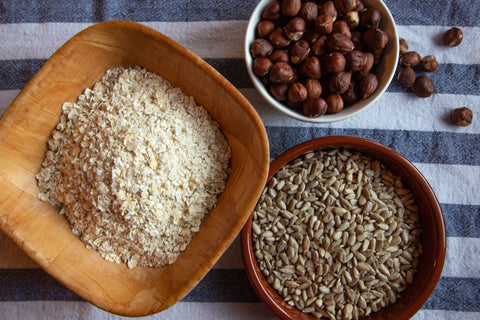What causes inflammation?
Posted on January 29 2020

Inflammation can sneak up on you quickly. Your habits and lifestyle choices can lump you with chronic inflammation in a flash if you’re not careful. While it’s true that fighting off inflammation is more than just finding a quick fix, knowing what causes it is a good place to start. That’s why we’ve put together some of the most common causes for you to consider.
Many lifestyle factors play a role in inflammation, but knowing what these triggers are means you can better control them. Once you figure out what’s causing any inflammation in your body, you can start to fight back. But we’ll take a closer look at that later on, when we focus on how to fight off inflammation. For now, let’s look in more detail at what exactly can trigger an inflammatory response.
Sensitivity to your surroundings
You probably don’t think about allergies all that much until spring time comes around and you start sneezing. But allergies can manifest all year round, and with more serious consequences than just a runny nose. This is because allergies and inflammation come hand in hand. The line between the two is pretty blurred, as either one can influence the other. Something that makes you more inflamed can worsen your allergies, and vice versa. We’re talking:
- dust,
- pollen,
- pets,
- insect bites,
or simply,
- an immune response to anything in your surroundings.
When you come into contact with an allergen, your immune system responds to its presence, and the allergen binds to antibodies, which trigger the release of chemicals like histamine that result in allergy symptoms. When your immune system stays active, inflammation persists, and this is when it’s known as chronic inflammation. If you have allergies, the most effective way to prevent inflammation is to avoid your environmental or dietary triggers.

Ingredients & intolerances
There’s a reason anti-inflammatory diets are on the up. Food sensitivities, as well as eating too much sugar, dairy, or trans-fat-filled fried foods, can trigger an inflammatory response in your body. One meal or snack might not be a problem, but over time, unhealthy patterns can heighten oxidative stress and chronic inflammation in your body.
This is particularly true if you’re sensitive to certain ingredients. For example, a gluten intolerance can cause inflammation throughout your body, not just your gut. Digestive inflammation might be the most obvious way this sensitivity comes to light, but it can also cause inflammation in your joints, immune system and nervous system.
If you’re not sure what food is triggering inflammation, you might want to try an exclusion diet where you leave out a certain food for set periods of time. This is followed by a period of time when you re-introduce one food at a time and see if your body reacts. If you’re sensitive to the food, you’ll most likely experience flare-up symptoms within a few days, including flu-like symptoms such as aches, fatigue, joint pain, headache, stomach problems. By identifying the specific cause, you can start to better understand and treat chronic inflammation. This is just one way you can fight off inflammation. We talk more about other ways to do this here.

Putting pressure on yourself
You know stress can have a negative impact on your mind. But another effect it can have is lowering your ability to regulate inflammation. When you’re under psychological stress, your body releases stress hormones like cortisol as part of your ‘fight-or-flight’ response. However, if you’re dealing with chronic stress, (say your job is leaving you constantly overwhelmed) your body gets stuck in this ‘fight-or-flight’ mode.
Basically, cortisol lingers in your body trying to fend of threats that don’t exist. Because inflammation is partly regulated by cortisol, constant stress means inflammation can easily get out of control. This explains why you often feel run-down when you’re particularly tense. Suffering from stress means you’re less likely to be able to regulate your normal defense mechanisms, which can quickly leave you feeling worse for wear.
What to remember
There are plenty of ways to keep inflammation under wraps, and all this starts with finding the root cause. This differs from person to person, so can take some digging, but for better long-term health it’s worth it. Dietary changes and stress management are just two places you can start in order to find the balance your body needs. Although it might seem overwhelming trying to find the causes, taking the right measures to lower inflammation can really pay off, and protect your body in the long run.
Shop Wellness & Immunity >





